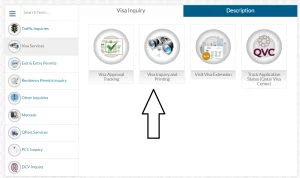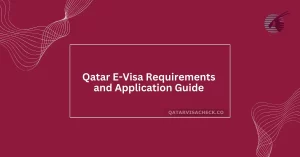Are you planning to work in a Gulf Cooperation Council (GCC) country? If so, you’ll need to get a GAMCA medical report. This important document is now known as a Wafid medical report. In this guide, we’ll explain everything you need to know about getting and checking your medical report online.
How to Check Your GAMCA/ Wafid Medical Report Online? (Quick Answer)
- Go to the official Wafid website.
- Select your identification method: Passport Number or GCC Slip Number.
- Enter your details and security code.
- Click “Submit” to view your results.
- Download or print your report if available.
Is GAMCA and Wafid the Same thing?
Yes, GAMCA and Wafid are essentially the same thing, but with a recent name change. GAMCA stands for Gulf Approved Medical Centers Association. As of January 15, 2023, GAMCA is now officially known as Wafid. This change was made to streamline the process and create a more unified system for medical testing for GCC countries.
The transition from GAMCA to Wafid hasn’t changed the core function of the organization. It still oversees the medical testing requirements for expatriates seeking to work in Gulf Cooperation Council (GCC) countries. The name change is part of a broader effort to modernize and improve the system, including enhanced online services and a more user-friendly interface.
While you may still hear people refer to it as GAMCA, especially those who have been through the process before, officially it’s now Wafid. When searching for information or booking appointments, it’s best to use “Wafid” to ensure you’re accessing the most up-to-date resources and services.
What is a GAMCA/Wafid medical report?
A GAMCA medical report, now known as a Wafid medical report, is an official document that certifies an individual’s health status for the purpose of working or residing in GCC countries. This report is the result of a comprehensive medical examination conducted at approved medical centers in the applicant’s home country.
The report typically includes results from various medical tests and examinations, such as:
- Blood tests: Screening for infectious diseases like HIV, Hepatitis B, and Hepatitis C.
- Chest X-ray: To check for tuberculosis and other lung conditions.
- Urine tests: To detect diabetes and other health issues.
- Physical examination: A general health check-up.
- Vision test: To ensure adequate eyesight for the proposed job.
- Blood pressure measurement: To check for hypertension.
The GAMCA/Wafid medical report is a crucial document that determines whether an individual is “fit” or “unfit” for work in GCC countries based on their health status. It’s designed to protect both the individual worker and the host country by ensuring that expatriates are healthy enough to work and live in the Gulf region.
Why Do You Need a GAMCA/Wafid Medical Report?
If you’re from countries like India, Bangladesh, or Pakistan and want to work in a GCC country, you need this medical report. It’s a must-have for many types of visas, including:
The report shows that you’re healthy enough to work in GCC countries. It helps these countries prevent the spread of diseases and make sure workers are fit for their jobs.
GCC Countries That Require GAMCA/Wafid Reports
The Gulf Cooperation Council (GCC) consists of six member states, all of which require GAMCA/Wafid medical reports for most expatriate workers. These countries are:
- Kingdom of Saudi Arabia (KSA): The largest GCC country, Saudi Arabia has strict requirements for foreign workers, including a comprehensive GAMCA/Wafid medical report.
- United Arab Emirates (UAE): Known for cities like Dubai and Abu Dhabi, the UAE requires GAMCA/Wafid reports for work and residence visas.
- State of Kuwait: Kuwait has specific health requirements, particularly focused on infectious disease screening.
- Kingdom of Bahrain: This island nation requires GAMCA/Wafid reports for most types of work and residence visas.
- Sultanate of Oman: Oman’s requirements are similar to other GCC countries, with some variations based on the type of work.
- State of Qatar: Qatar, especially with its recent developments, has strict health requirements for foreign workers.
Each of these countries may have slightly different requirements or additional tests based on the type of work or length of stay. For example:
- Saudi Arabia often has the most comprehensive requirements, including tests for HIV, Hepatitis B and C, Tuberculosis, and other conditions.
- The UAE may require additional drug screenings for certain professions.
- Kuwait is particularly strict about tuberculosis screening.
- Bahrain might have specific requirements based on the sector of employment.
- Oman and Qatar generally follow similar guidelines to other GCC countries but may have additional requirements for food handlers or healthcare workers.
It’s important to note that while the GAMCA/Wafid system provides a standardized process, each country retains the right to add or modify requirements based on their specific public health needs or policies. Always check the most recent requirements for the specific GCC country you’re planning to work in.
The GAMCA/Wafid Medical Test Process
The GAMCA/Wafid medical test process involves several steps:
Step 1: Appointment Booking
- Visit the official Wafid website.
- Create an account if you don’t have one.
- Choose your nearest approved medical center.
- Select an available date and time slot.
- Pay the required fee online.
- Receive a confirmation slip with your appointment details.
Step 2: Preparation
- Fast for 8-12 hours before your appointment (for blood tests).
- Bring your passport, appointment slip, and any required documents.
- Wear comfortable clothing that’s easy to change out of for the chest X-ray.
Step 3: At the Medical Center
- Arrive on time with all necessary documents.
- Register at the reception and verify your details.
- You may be asked to change into a gown for some tests.
Step 4: Medical Examinations
- Blood Tests: To screen for HIV, Hepatitis B and C, and other conditions.
- Urine Test: For diabetes screening and drug tests (if required).
- Chest X-ray: To check for tuberculosis and other lung conditions.
- Physical Examination: A doctor will check your general health, including blood pressure, height, and weight.
- Vision Test: To ensure adequate eyesight for your proposed job.
- Additional Tests: Depending on the requirements of the specific GCC country or job type.
Step 5: Post-Examination
- You may be given immediate results for some tests.
- The center will inform you when to expect your full results (usually 2-4 working days).
Step 6: Results Processing
- The medical center processes your test results.
- They upload the results to the Wafid system.
Step 7: Report Generation
- Based on your test results, a medical report is generated indicating whether you are “Fit,” “Unfit,” or need a “Retest.”
Step 8: Checking Results
- After 2-4 working days, you can check your results online through the Wafid website.
Step 9: Next Steps
- If “Fit,” you can proceed with your visa application.
- If “Unfit,” you’ll need to wait for a specified period before retesting.
- If “Retest” is required, you’ll be informed which tests need to be repeated.
Remember, the specific tests and process may vary slightly depending on the GCC country you’re applying to and your job type. Always follow the instructions provided by the Wafid system and your chosen medical center.
How to Check the GAMCA/Wafid Medical Report Status Online?
Checking your GAMCA (now Wafid) medical report status online is a straightforward process. Here’s a detailed guide:
Step 1: Visit the Official Website
- Go to the official Wafid website (https://www.wafid.com).
- Look for the “Check Medical Status” or similar option.
Step 2: Choose Your Identification Method
You can check your status using one of two methods: a) Passport Number and Nationality:
- Select your nationality from the dropdown menu.
- Enter your passport number exactly as it appears on your passport. b) GCC Slip Number:
- This is the number you received when you booked your appointment.
- It’s usually a safer option as it’s specific to your medical test.
Step 3: Enter the Security Code
- You’ll see a captcha or security code on the screen.
- Type this code into the provided box to prove you’re not a robot.
Step 4: Click “Submit” or “Check Status”
- After entering all required information, click the button to proceed.
Step 5: View Your Results
- If your results are ready, you’ll see your medical status on the screen.
- The status will typically be “Fit,” “Unfit,” or “Retest Required.”
Step 6: Download or Print Your Report
- If available, you may have the option to download a PDF of your report.
- You can also print the report directly from this page.
Step 7: Check Additional Details
- Some systems may provide more detailed information about your test results.
- This could include the validity period of your medical certificate.
Step 8: Unable to Find Results?
- If you can’t find your results, double-check that you’ve entered all information correctly.
- Remember that results typically take 2-4 working days to be uploaded.
- If it’s been longer than expected, contact the medical center where you took the test.
Step 9: Save Your Information
- It’s a good idea to save or print your results for your records.
- You may need this information for your visa application process.
Remember, the exact steps might vary slightly depending on updates to the Wafid system or specific requirements of different GCC countries. Always follow the most current instructions provided on the official Wafid website.
GAMCA/Wafid Medical Report Status Results
When you check your GAMCA (now Wafid) medical report status online, you’ll typically see one of three main status types:
Fit
- This is the desired outcome.
- It means you have passed all required medical tests and are cleared to work in the GCC country you’re applying to.
- A “Fit” status indicates that:
- You don’t have any infectious diseases that would prevent entry.
- You’re physically capable of performing the job you’re applying for.
- You meet all health requirements set by the GCC country.
Unfit
- This status means you did not pass one or more of the required medical tests.
- Reasons for an “Unfit” status can include:
- Infectious diseases like HIV, Hepatitis B or C, or Tuberculosis.
- Chronic health conditions that might affect job performance or require extensive medical care.
- Physical disabilities that could impede job performance.
- Mental health issues that are deemed severe.
- An “Unfit” status usually means you cannot proceed with your visa application.
- There’s typically a waiting period (often 3-6 months) before you can reapply for the medical test.
Retest Required
- This status indicates that one or more of your test results were inconclusive or borderline.
- You’ll need to repeat specific tests as indicated by the medical center.
- Reasons for a “Retest” status can include:
- Unclear X-ray results.
- Borderline blood test results that need confirmation.
- Technical issues with a particular test.
- You should arrange for the retest as soon as possible, usually at the same medical center.
What Happens If You’re “Unfit”?
If your report says “Unfit”, don’t panic. Here’s what you can do:
- Understand Why: Ask the medical center to explain which test you didn’t pass.
- Get Treatment: If it’s a treatable condition, get help from your doctor.
- Wait and Retest: After 3 months, you can take the tests again.
- Explore Other Options: Consider jobs in countries with different health requirements.
Important Things to Know About GAMCA/Wafid Medical Reports
- Validity: A “Fit” report is good for 60 days. You must get your visa within this time.
- Age Limit: You must be at least 22 years old to take the test for a work visa.
- Pregnancy: If you’re pregnant, you’ll need a special letter (NOC) from the embassy to skip the X-ray.
- Children: Kids under 12 only need a basic check-up, not the full set of tests.
- Cost: The fee varies by country but is usually paid online when you book your appointment.
Tips for a Successful GAMCA/Wafid Medical Test
- Book Early: Appointment slots can fill up fast, especially in big cities.
- Be Prepared: Bring all required documents, including your passport and appointment slip.
- Fast Before the Test: You might need to fast for 8-12 hours before blood tests.
- Stay Hydrated: Drink plenty of water before your urine test.
- Dress Comfortably: You’ll need to change for the chest X-ray.
- Be Honest: Tell the doctors about any health conditions or medications you take.
GAMCA medical report validity
The validity of a GAMCA (now Wafid) medical report is an important factor to consider in your visa application process. Here are the key points regarding the validity of these reports:
Standard Validity Period
- Typically, a “Fit” GAMCA/Wafid medical report is valid for 60 days (2 months) from the date of issue.
- This means you have 60 days to use this report for your visa application process.
Variation by Country
- The exact validity period can vary depending on the specific GCC country you’re applying to:
- Saudi Arabia: Usually 60 days
- UAE: Typically 60 days, but can sometimes be 90 days
- Kuwait: Generally 60 days
- Bahrain: Often 60 days
- Oman: Usually 60 days
- Qatar: Typically 60 days, but can sometimes be 90 days
Validity Start Date
- The validity period usually starts from the date the medical report is issued, not the date you took the tests.
Using the Report
- You must submit your visa application or have your work permit processed within this validity period.
- If the validity expires before your visa is processed, you may need to undergo another medical examination.
Extensions
- Generally, GAMCA/Wafid medical reports cannot be extended beyond their original validity period.
- If your report expires, you’ll need to take a new medical examination.
Employer Requirements
- Some employers might require a more recent medical report, even if your GAMCA/Wafid report is still technically valid.
Visa Processing Time
- Consider the visa processing time of the GCC country you’re applying to when planning your medical examination.
- It’s best to have enough validity left on your medical report to account for potential delays in visa processing.
Reentry and Renewals
- If you leave the GCC country and return, or if you’re renewing your residence permit, you may need a new medical examination, even if your previous one is still valid.
“Unfit” Results
- If you receive an “Unfit” result, there’s usually a waiting period (often 3-6 months) before you can take another GAMCA/Wafid medical examination.
Pregnancy
- For pregnant women, special rules may apply. Some countries might extend the validity of the medical report or have different requirements.
Keeping Track
- It’s your responsibility to keep track of your medical report’s validity.
- Mark the expiration date on your calendar and plan your visa application accordingly.
Remember, regulations can change, and there might be exceptions or special cases. Always verify the most current validity period with the official Wafid website or the embassy of the GCC country you’re applying to. It’s also a good idea to consult with your employer or visa sponsor about any specific requirements they might have regarding the medical report’s validity.
Frequently Asked Questions
Can I use any medical center for the GAMCA/Wafid tests?
No, you must use an approved center. The list is available on the Wafid website.
How much does the GAMCA/Wafid medical test cost?
Costs vary by country and center. Check the Wafid website for current prices.
Can I appeal an “Unfit” result?
Generally, no. You’ll need to wait 3 months before retesting.
Do I need to fast before the medical tests?
It’s usually recommended to fast for 8-12 hours before blood tests.
Can I get a GAMCA/Wafid medical test if I’m pregnant?
Yes, but you’ll need special permission to skip the X-ray.

Hey there, I’m Hamza Al-Abdullah, the brains and heart behind Qatarvisacheck.qa. Proudly rooted in the bustling city of Doha, Qatar, I’ve made it my mission to untangle the visa web for fellow travelers. My website isn’t just a hub for visa info; it’s a personalized journey through the often confusing world of travel documents.







